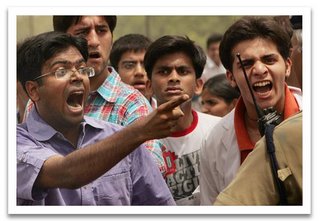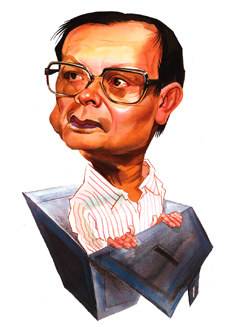Mumbai is not the repository of polished culture, courtesy and soft spoken denizens. Such culture and polite manners are expected when you're in a Western Country, everyone's happy (never mind George Bush) and polite exchanges are flowing as smooth as the Thames.
So what makes the recent Reader's Digest survey a topic of such debate? Is Mumbai indeed one of the rudest cities in thw world? The media has had a field day discussing the issue. Precious editorials have been devoted to it, guest columnists have been invited to write about their experiences in Mumbai, Mumbai Mirror reporter Bapu Deedwania purposefully dropped a bunch of papers at road crossing, only to end up photographed by her shutterbug and appear on the cover page and to prove that somebody did help her pick them up. That's not all - even Karan Thapar hosted a show on CNBC TV-18 figuring out with the help of several icons of the city, whether the survey had hit alarm buttons on Mumbaikar's manners.
While the survey elaborated on how an average Mumbai-ite never held doors for you, hardly said Thank-you's or Sorry's, what strikes through is the fact that the survey would have been held true for all of India. Why pigeon-hole Mumbai on the rude-oh-meter? Perhaps the survey was limited to certain famous cities of the world, but isnt it a obvious question that what holds true in one city may not follow a similar pattern in the other?
similar pattern in the other?
I'm willing to believe that the RD survey is a mere conjecture, wherein an inference has been arrived at without situational proof. Every great city has its individual class, which is mirrored by the people who reside, travel and identify with it. Mumbai, the potpourri of the rich and the poor, the haughty and the meek, the winners and the losers, builders and destroyers, the corrupt and the principled - similarly has its own value culture. Chivalry isn't a part of Indian psyche and hence, even though we may treat guests as God, we often leave them to fend for themselves until of course they refer back to us.
However, there is no denying that Indians are helpful when it comes to guidance. This country is full of experts , nevertheless also the financial capital of the country, Mumbai is a place where the educated class thrive. But do Mumbaikars indeed have the chutzpah to slam a door on your face? I'm not sure. If you've faced it, you need to watch your nose, next time around.
On the other hand, let us not forget the limitations of a survey like this. Notice the Health pages in the daily newspaper? Every other day a new survey result emerges and a study arrives at its conclusion - but how much do we adhere to it? Chocolates are good for the womb, chocolates are good for sexual life, smoking can cause your child to grow excess hair on his hair-lobes...
How many of these surveys have actually impacted our lives with such immediacy that we take this RD survey personally?
Mumbai may surely have its own way of dealing with it, by having its own share of stories to defy the survey. It is true, that Thank-you's and Sorry's are not the most often heard words on Indian streets. But there is no denying that Indians are the most warmest and friendliest people on this planet. Ask any tourist or traveller and he'll echo the same sentiments. In a country that is bound together by so many bonds in the face of diversity, unemployment, corruption, starvation, poverty, illiteracy, it is infact the smile on the faces of our people that has taken many a researcher into a puzzle at the spirit of this nation and its people who've been brought up under sub-standard conditions, always in a struggle for survival. And dear, when life is a struggle, we often take the manners for ransom.
So what makes the recent Reader's Digest survey a topic of such debate? Is Mumbai indeed one of the rudest cities in thw world? The media has had a field day discussing the issue. Precious editorials have been devoted to it, guest columnists have been invited to write about their experiences in Mumbai, Mumbai Mirror reporter Bapu Deedwania purposefully dropped a bunch of papers at road crossing, only to end up photographed by her shutterbug and appear on the cover page and to prove that somebody did help her pick them up. That's not all - even Karan Thapar hosted a show on CNBC TV-18 figuring out with the help of several icons of the city, whether the survey had hit alarm buttons on Mumbaikar's manners.
While the survey elaborated on how an average Mumbai-ite never held doors for you, hardly said Thank-you's or Sorry's, what strikes through is the fact that the survey would have been held true for all of India. Why pigeon-hole Mumbai on the rude-oh-meter? Perhaps the survey was limited to certain famous cities of the world, but isnt it a obvious question that what holds true in one city may not follow a
 similar pattern in the other?
similar pattern in the other?I'm willing to believe that the RD survey is a mere conjecture, wherein an inference has been arrived at without situational proof. Every great city has its individual class, which is mirrored by the people who reside, travel and identify with it. Mumbai, the potpourri of the rich and the poor, the haughty and the meek, the winners and the losers, builders and destroyers, the corrupt and the principled - similarly has its own value culture. Chivalry isn't a part of Indian psyche and hence, even though we may treat guests as God, we often leave them to fend for themselves until of course they refer back to us.
However, there is no denying that Indians are helpful when it comes to guidance. This country is full of experts , nevertheless also the financial capital of the country, Mumbai is a place where the educated class thrive. But do Mumbaikars indeed have the chutzpah to slam a door on your face? I'm not sure. If you've faced it, you need to watch your nose, next time around.
On the other hand, let us not forget the limitations of a survey like this. Notice the Health pages in the daily newspaper? Every other day a new survey result emerges and a study arrives at its conclusion - but how much do we adhere to it? Chocolates are good for the womb, chocolates are good for sexual life, smoking can cause your child to grow excess hair on his hair-lobes...
How many of these surveys have actually impacted our lives with such immediacy that we take this RD survey personally?
Mumbai may surely have its own way of dealing with it, by having its own share of stories to defy the survey. It is true, that Thank-you's and Sorry's are not the most often heard words on Indian streets. But there is no denying that Indians are the most warmest and friendliest people on this planet. Ask any tourist or traveller and he'll echo the same sentiments. In a country that is bound together by so many bonds in the face of diversity, unemployment, corruption, starvation, poverty, illiteracy, it is infact the smile on the faces of our people that has taken many a researcher into a puzzle at the spirit of this nation and its people who've been brought up under sub-standard conditions, always in a struggle for survival. And dear, when life is a struggle, we often take the manners for ransom.







